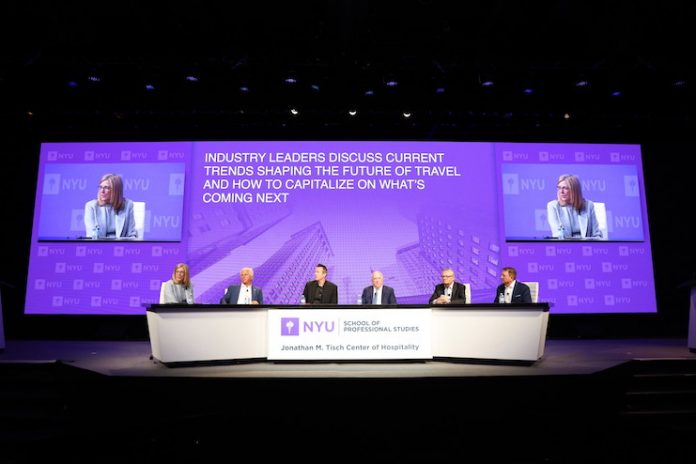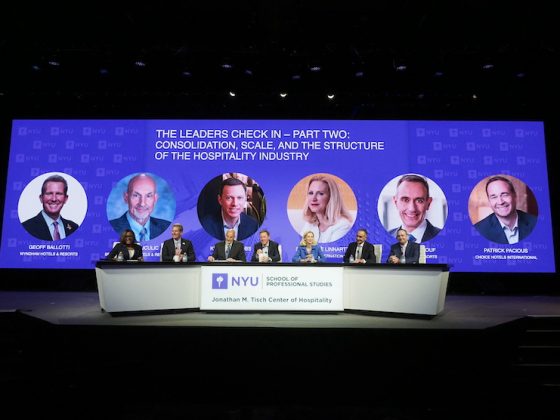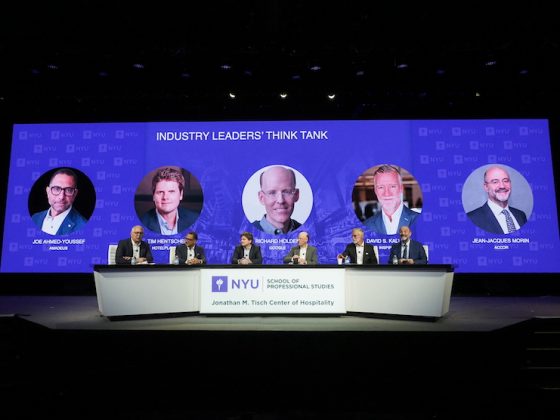
NEW YORK—During day two of the 44th annual NYU International Hospitality Industry Investment Conference, hosted by the NYU SPS Jonathan M. Tisch Center of Hospitality at the New York Marriott Marquis in New York City, the conversation focused on the changing dynamics of the industry and how hotels and the entire travel and tourism industry are keeping up with, and staying ahead of, factors that are profoundly influencing the business including changing consumer preferences, technology, labor shortages, supply chain issues, competition from private rentals, and the demands of a younger generation of travelers who are coming into their own.
Kicking off day two, Eileen Crowley, partner; vice chair—U.S. transportation, hospitality and services co-leader, Deloitte & Touche, moderated the “Industry Leaders Discuss the Future of Travel and How To Capitalize on What’s Coming Next” panel, which featured industry leaders including John Cohlan, CEO, Margaritaville; Sloan Dean, CEO and president, Remington Hotels; John Murray, president and CEO, Sonesta International Hotels; Peter Strebel, chairman, Omni Hotels & Resorts; and Jeff Wagoner, president and CEO, Outrigger Hospitality Group. The conversation revolved around how to meet changing consumer demands while dealing with labor shortages, supply chain issues, and competitors in the private rental space, such as Airbnb. One of the major topics of discussion focused on the up-and-coming generation—from a consumer standpoint and a future employee standpoint. Panelists discussed working more closely with universities to reach college students, who they believe will be instrumental in implementing and utilizing new technology. They also focused on trends related to group travel and experiential services—designed to keep guests happy but sometimes harder to implement due to labor shortages, which add to the complexity of fulfilling these demands.
During the “Leaders Check In Part Two: Consolidation, Scale, and the Structure of the Hospitality Industry,” moderated by Jeanelle Johnson, principal and lead client partner, PricewaterhouseCoopers, technology dominated the conversation between Geoff Ballotti, president and CEO, Wyndham Hotels & Resorts; Larry Cuculic, president and CEO, Best Western Hotels & Resorts; Kevin J. Jacobs, CFO and president, global development, Hilton; Stephanie Linnartz, president, Marriott International; Elie W. Maalouf, CEO, IHG Hotels and Resorts; and Patrick Pacious, president and CEO, Choice Hotels International. The group discussed the concept of the “phigital”—a combination of the physical world and the digital world. All agreed the hospitality industry is people-oriented and will never become fully automated. Yet, there was a consensus that technology can provide efficiency, and data and analytics can ultimately help create a highly personalized and seamless experience for guests. Across the industry, technology is one of the largest investments from a time and money perspective. This challenges industry leaders to make strategic decisions to ensure ROI. Diversity and inclusion were also prominent themes, along with sustainability, with executives agreeing that both are critical for industry success and are important to guests and investors. The conversation ended in excitement about the industry’s future, with all the panelists agreeing that while they are cautiously optimistic, they believe increased consumer savings, higher wages, and pent-up demand will contribute to a successful 2022 despite concerns about the larger economy.
The “Industry Leaders’ Think Tank” moderated by Umar Riaz, managing director, EY, featured Joe Ahmed-Youssef, executive vice president of business intelligence and data, hospitality, Amadeus; Tim Hentschel, co-founder and CEO, HotelPlanner; Richard Holden, vice president and general manager, travel, Google; David Kallery, president, Inspirato; and Jean-Jacques Morin, deputy CEO and chief financial officer group, Accor, and focused on the implementation of technology. Richard Holden of Google discussed the use of technology from a business perspective—specifically the use of SEO for marketing and sales. All panelists shared that their companies are investing heavily in technology. Other areas requiring funding included investment in employees and investment in developing experiential services for guests. From food and beverage to building itineraries, the panelists discussed the critical point that hotel leaders must focus on more than just the walls and floors of the hotel. In the area of emerging trends, hotels are seeing customers book as little as 0-6 days before their stay, while others are seeing guests book as far as a year in advance. Similar to other panels, there was excitement about the new opportunities in the industry, but there also was an acknowledgment that new solutions are needed to address continually evolving challenges.












